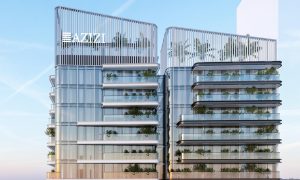Evolving with the times
Masood Al Awar, CEO of Medallion Associates, on the state of the UAE’s real estate market, and why quick-thinking developers and investors can take advantage of opportunities presented by the COVID-19 crisis

Home transactions in the UAE fell by almost 50% between the first two quarters of the year as the effects of the COVID-19 pandemic hit the UAE real estate market, a report by consulting firm ValuStrat says.
In its UAE real estate market ‘1st Half 2020’ report, the firm explains that the first six months saw the completion of an estimated 14,000 (30%) of the 45,7000 residential units scheduled for handover this year. Meanwhile, Q2 residential home sales transactions totalled 4,459 – down 48.8% QoQ and 39.9% YoY, with a value of $1.09 billion. Off-plan sales represented 66% of all home sales, it adds.
In terms of commercial property, office sales transactions during the second quarter of 2020 were 80.2% lower when compared to the same period last year.
“Overall transacted office prices fell 2.8% YoY and 7% QoQ to AED 7,169 per sq m (AED 666 per sq ft). Median office asking rents declined 8.6% annually but remained stable quarterly and stood at AED 864 per sq m (AED 80 per sq ft) for typical office units. Citywide office occupancy stood at 80.4%,” reveals the report.
Unsurprisingly, the retail sector was also hit hard by the introduction of lockdown measures required to protect UAE residents from the spread of the Coronavirus.
“Majid Al Futtaim’s 2019 report announced 92% average occupancy for its malls in Dubai. Mall footfall across its entire portfolio grew 4% YoY and reached a record of more than 200 million visitors. The first half of 2020 saw movement restrictions negatively impact retail footfall, accelerating efforts towards e-commerce expansion, and with restrictions being eased towards the usually quite summer period, many stores offered price discounts and promotions to entice shoppers,” it adds.
Meanwhile, hospitality was likewise affected negatively by the pandemic with movement restrictions due to the COVID-19 pandemic negatively impacted tourism on a global scale.
A HotStats report found that the average Revenue Per Available Room (RevPAR) during the month of May was at a record low of AED 47.2, down 84.4% when compared to May last year. Dubai’s combined average RevPAR for the period January to May this year was AED 328.8, 48.4% below the same period last year.
Optimistic Outlook
As these figures indicate, the UAE has been no exception to the global economic disruption caused by the public health emergency after a strong start to the year. In order to better understand where the market is headed, what opportunities exist for investors, and what the real estate development industry needs to do to adapt to the ‘New Normal’, Big Project ME spoke to Masood Al Awar, CEO of Medallion Associates, a globally networked real estate investment advisory firm that is headquartered in Dubai.
“The UAE’s real estate market, a key sector in the government’s economic diversification efforts, had faced some difficult headwinds in the past even before the pandemic, yet it emerges more resilient and stronger every time.
Under the present challenging environment, we have reasons to believe that the sector – strongly supported by the country’s wise leaders – is poised for significant growth as the country remains attractive to investors,” Al Awar says. “The UAE has also retained its reputation as one of the vital global hubs for business, trade, and leisure, which will help drive activities within the sector, especially after in the aftermath global health crisis.”
For Dubai particularly, the property sector’s economic contribution stood at 8% during the first quarter of 2020, while real estate construction contracts amounted to $3.19 billion, or 34% of the total value of contracting contracts concluded in the country, he adds.
While activities in the emirate’s real estate may have slowed down because of the coronavirus pandemic (COVID-19), the outlook on its future expansion remains optimistic, Al Awar asserts.
“In fact, Dubai Land Department has recorded a total of 15,897 sales transactions valued at $8.84 billion between January to June. The emirate’s recovery will have a positive impact on the growth prospects of the UAE’s property market.
“Further, it helps that real estate developers and operators have been evolving to allow them to adapt to the ‘new normal.’ As a result, other real estate assets such as warehousing, logistics and data centres are gaining attention as a new haven for investments. With the gradual reopening of the economy and easing of restrictions, we are confident that the activities within the industry will pick-up. Improved sentiments among travellers will also give the country’s real estate industry a boost,” he states.
Al Awar points out that long-term investors will be savvy enough to know that the long-term effects of the pandemic, while significant, will not last and that the real estate market will eventually bounce back. If they stay focused on their objectives, they will be able to take advantage of the opportunities that will present themselves because of the pandemic, he insists.
“This is why several have been capitalising on the declining property prices, low mortgage interest rates, higher loan to value, reduced service charges, attractive valuations and the UAE’s investor-friendly policies in the hope of yielding higher return on investments arising from the market’s full recovery,” he says. “With this same mindset, some have also adopted a systematic and forward-looking approach through regular investing.
“Others, however, have understandably required different types of support from their relationship managers and wealth advisers to help them deal with uncertainties as the value of their portfolio declined.
“Despite the global outbreak of COVID-19, the market’s confidence in Dubai’s real estate market remains strong as transactions worth $19.73 billion took place during the first half of 2020. There was a considerable decline from Q1 to Q2 of this year in terms of investments where 9,160 investors completed 11,940 investments valued at $5.77 billion, whereas in Q2 2020, only 5,528 investors made a total of 6,523 investments worth $2.99 billion.
“However, as per our analysis, other segments apart from offices, residential and retail complexes are set to outperform other asset classes in the near term. Developers should, therefore, take a closer look into areas with higher growth potentials,” Al Awar suggests.
Furthermore, the COVID-19 pandemic has accelerated digital transformation and adoption across industries, and the real estate industry is no different. With future property projects likely to be more technology-driven to ensure their sustainability and longevity, Al Awar suggests.
“We see increased attention on the need to transform housing policies post-pandemic to ensure not only comfort, but sustainability as well. As such, factors such as building typology, resource efficiency, connectivity and urban greenery will play a huge role in how we design and build development projects in the future. These trends are expected to be permanent as the industry works towards becoming more resilient, to make it highly prepared for future global crises and emergencies.”
Despite his optimism for the long-term health of the market, Al Awar does concede that in the immediate future, he has concerns about how developers are financing and planning their projects.
“Looking at the state of local real estate market, which remains fragmented and has not yet fully matured from a supply side, it is very challenging for big developers because if they are providing the market with a big supply of units under the umbrella of one major project, they need to mobilise a huge number of retail investors, which is time and resource consuming. In addition to that, there are new rules from the Dubai Land Department which they need to consider. With these tighter regulations, it will be difficult to convince retail investors,” he points out.
“We consider institutional investors to be a key solution, and currently, the UAE market has less than five per cent of total contribution from this type of investors. Institutional investors have preference over projects that look into the yield, risk, high liquidity and shorter maturities, which are completely different from retail investors,” he explains.
“Changing strategies and tactics to conform to the evolving investment trends is necessary for developers to meet the modern needs of their clients. For one, adopting a digital strategy approach will help them be more competitive, especially during this unprecedented period.
“In this regard, they can, for instance, build a more interactive online portal where they can conduct virtual tours of their properties for their clients. Also, it is critical for developers to increase their brand value through proactive customer engagement during this time for stronger sales and enterprise appeal as well as faster post-pandemic recovery. With enhanced brand value, they are in a position to attract more institutional and individual investors.”
Having a transformation strategy in place is something Al Awar firmly believes in, as he reveals that Medallion Associates has deployed several initiatives that will enable the advisory business to take advantage of technology and adapt to the current market situation.
“We have been leveraging our advisory arm launched in February to address the growing demand for process enhancement, data analytics and financing restructuring. Our foresight had enabled us to make a strategic move early this year that would help entities affected by the crisis.
“Following the declaration of the pandemic and eventual lockdown order, we have seen increased demand for our out-of-the-box financing restructuring. To date, we are raising more than $1.49 billion complex capital, involving international investment bankers, in addition to finalising our support for the local medium-to-large businesses. All our efforts are being done remotely, not allowing the pandemic to hinder us from working and delivering value to our clients,” he points out.
Outside Interest
Al Awar states that his company is seeing continued robust and healthy foreign investment interest into the UAE, particularly in Dubai. With the government’s unwavering support, as well as key real estate investment laws and regulations in place, he anticipates foreign investor interest to play a key role in the country’s real estate market going forwards.
“As a matter of fact, Medallion Associates is already in an advanced phase of processing $1.49 billion worth of foreign real estate investments funds to be deployed in a couple of landmark Dubai property projects during this pandemic Investors continue to keep an eye on promising location investments and prime properties in Dubai and the UAE. The steps taken by property developers such as deploying financing programs for clients, partners and tenants, adopting next-generation technologies and taking advantage of economic aid packages have also helped boost the investors’ confidence in the local market along with the economic and financial value of their assets portfolios, he says.
With the UAE and Israel signing a historic peace treaty in recent weeks, Al Awar believes that there will be a positive impact on the local real estate sector, with an increase in fresh investor interest and business.
“We are confident that the UAE market will feel the benefits before the upcoming Expo in October 2021. Furthermore, the real estate market in the UAE is much more flexible in terms of financing options, and has a wide array of free-hold investment opportunities.”
Looking ahead, Al Awar says that for the remainder of the year and beyond, Medallion Associates will focus on continuing to capitalise on relevant public-private partnership (PPP) opportunities across all areas, specifically in the government’s large-scale smart city projects, in line with the vision of His Highness Sheikh Hamdan bin Rashid Al Maktoum, Crown Prince of Dubai and Chairman of the Dubai Executive Council, who is a consistent advocate for government and private sectors coming together to adopt the PPP model as a key driver for growth and success.
“PPP is the key to attracting private capital and expertise, and we are more than willing to explore key areas of cooperation and contribute to the country’s progress while providing our clients with higher return on investment,” Masood explains.
“We are also in the final stage of closing a major investment for some iconic projects both locally and internationally through our strategic partners.
“Furthermore, Medallion Associates continues to support the Dubai Land Department through its international efforts to promote the emirate’s real estate.
“We have offices in Kuala Lampur and London and are currently preparing the second edition of ‘Dubai into the Future’, an event to be held in London which will host real estate developers, institutional investors, family offices, officials of different countries and professionals,” he concludes.

























